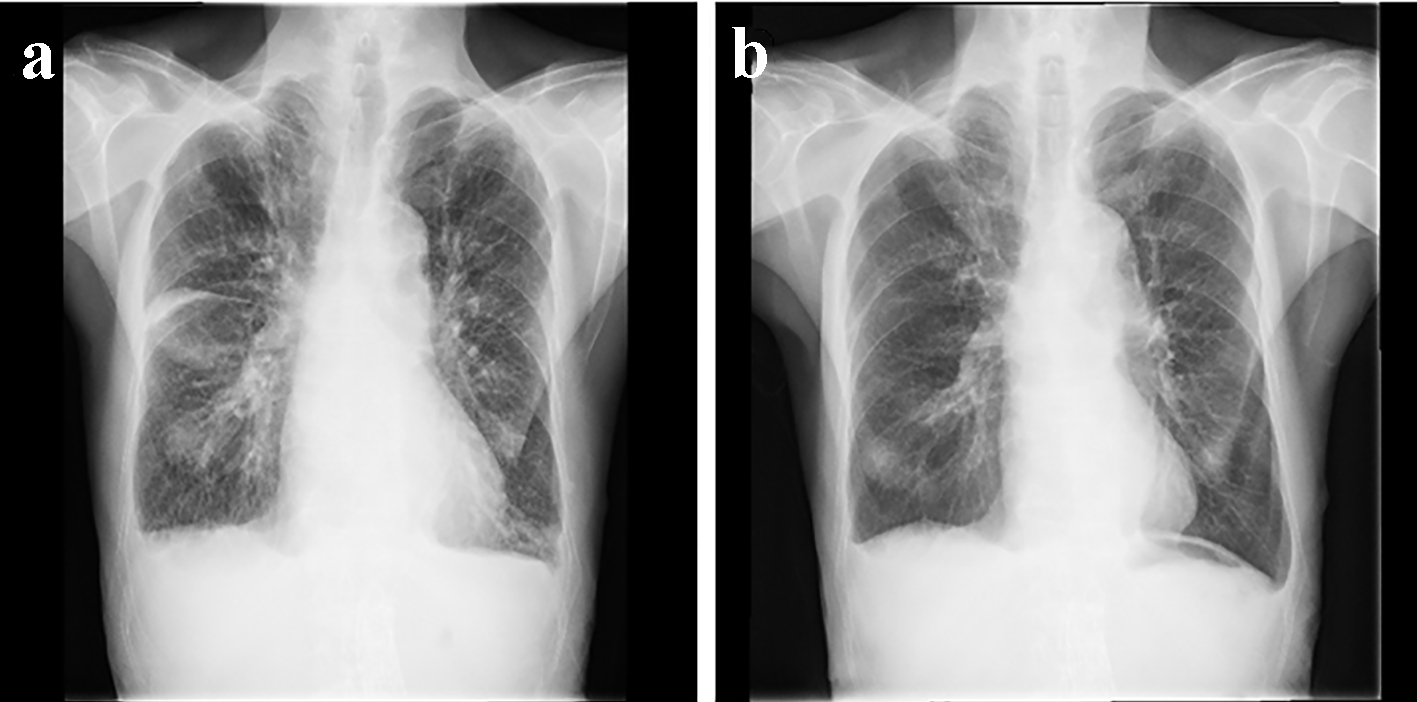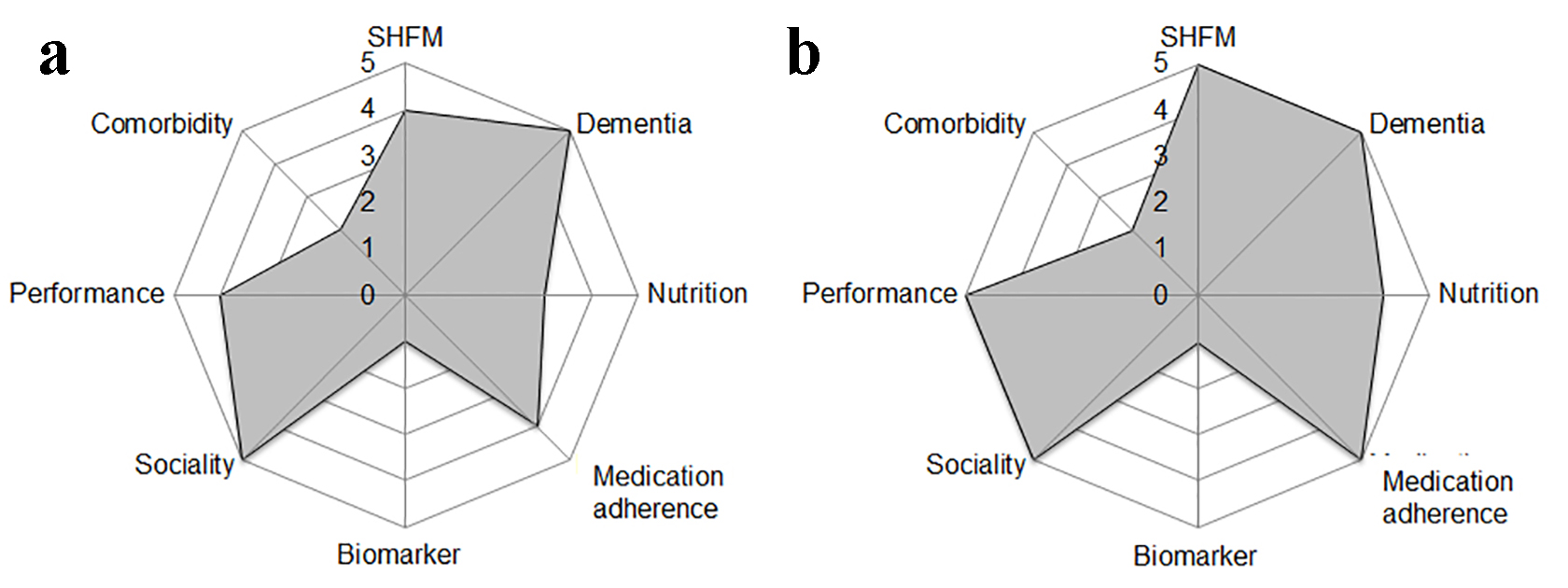
Figure 1. Chest radiography on admission (a) and at discharge (b).
| Cardiology Research, ISSN 1923-2829 print, 1923-2837 online, Open Access |
| Article copyright, the authors; Journal compilation copyright, Cardiol Res and Elmer Press Inc |
| Journal website https://www.cardiologyres.org |
Case Report
Volume 8, Number 6, December 2017, pages 339-343
A Case of Multifaceted Assessment in an Elderly Patient With Acute Decompensated Heart Failure
Figures


Tables
| Score, points | 1 (failure) | 2 (poor) | 3 (fair) | 4 (good) | 5 (excellent) |
|---|---|---|---|---|---|
| A. Prediction of survival in heart failure (HF) using the Seattle Heart Failure Model (SHFM) | |||||
| Mean life expectancy, years | < 2 | ≥ 2 and < 3 | ≥ 3 and < 4 | ≥ 4 and < 5 | ≥ 5 |
| B. Dementia | |||||
| Score, points | 1 | 2 | 3 | 4 | 5 |
| Revised Hasegawa’s dementia scale (HDS-R), points | ≤ 6 | 7 - 12 | 13 - 18 | 19 - 24 | 25 - 30 |
| C. Nutrition | |||||
| Score, points | 1 | 2 | 3 | 4 | 5 |
| Mini-nutritional assessment (MNA), points | ≤ 10 | > 10 and < 17 | ≥ 17 and < 21 | ≥ 21 and < 24 | 24 - 30 |
| D. Medication adherence | |||||
| Score, points | 1 | 2 | 3 | 4 | 5 |
| Adherence, points | < 30 | 30 - 39 | 40 - 49 | 50 - 59 | 60 - 70 |
| E. Biomarker | |||||
| Score, points | 1 | 2 | 3 | 4 | 5 |
| Brain natriuretic peptide (BNP), pg/mL | > 500 | 200 - 500 | 100 - 199 | 40 - 99 | < 40 |
| F. Sociality | |||||
| Score, points | 1 | 2 | 3 | 4 | 5 |
| Home care score (HCS), points | ≤ 3 | 4 - 6 | 7 - 8 | 9 - 10 | > 10 |
| G. Performance | |||||
| Score, points | 1 | 2 | 3 | 4 | 5 |
| Modified frailty index derived from the Canadian Study of Health and Aging (CSHA), frailty impression | Terminally - very severely frail | Severely - moderately frail | Moderately frail | Mildly frail - vulnerable | Managing well - well - very fit |
| H. Comorbidity | |||||
| Score, points | 1 | 2 | 3 | 4 | 5 |
| Charlson comorbidity index, points | ≥ 6 | 5 | 3 - 4 | 1 - 2 | 0 |
| Points | |
|---|---|
| 1 point: not applicable; 2 point: not very true; 3 point: neither agree nor disagree; 4 point: slightly true; 5 point: applies. | |
| A. Coordination with medical staff regarding medication | |
| 1) Regarding medicine, I can ask medical staff such as medical doctors without hesitation. | 1 - 5 |
| 2) Regarding medicine, I can share my previous treatment course with medical staff such as medical doctors. | 1 - 5 |
| 3) Regarding medicine, I can share my thoughts and goals with medical staff such as medical doctors. | 1 - 5 |
| B. Aggressiveness in acquiring and using information about medication | |
| 4) I ask if there is something I do not know about my medication. | 1 - 5 |
| 5) I report side effects of medicines, allergic symptoms, and unusual symptoms. | 1 - 5 |
| 6) I know about my medicines and why they are needed. | 1 - 5 |
| 7) I use approaches to continue taking my medicine (ingenuity in daily life, etc.) | 1 - 5 |
| 8) I am looking for and using information necessary for my medicines. | 1 - 5 |
| C. Conviction regarding medication and degree of cooperation | |
| 9) I am convinced about the necessity of my medicines. | 1 - 5 |
| 10) The use of medicines is part of my life, like eating meals and brushing my teeth. | 1 - 5 |
| 11) My family members and other people offer no resistance to helping me, such as by making phone calls regarding my medications. | 1 - 5 |
| D. Compliance with medication | |
| 12) Medication has been used for the indicated number of times or tablets over the last three weeks. | 1 - 5 |
| 13) Medication has been used for the indicated time over the last three weeks. | 1 - 5 |
| 14) I did not stop taking my medicines at my own discretion. | 1 - 5 |
| Total points | 14 - 70 |